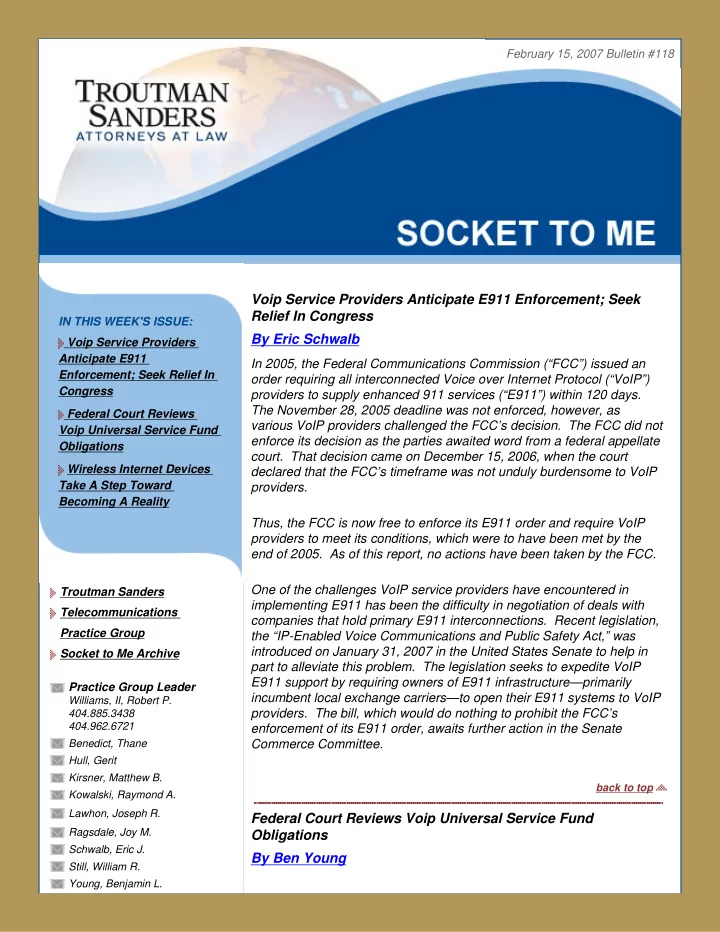

February 15, 2007 Bulletin #118 Voip Service Providers Anticipate E911 Enforcement; Seek Relief In Congress IN THIS WEEK'S ISSUE: By Eric Schwalb Voip Service Providers Anticipate E911 In 2005, the Federal Communications Commission (“FCC”) issued an Enforcement; Seek Relief In order requiring all interconnected Voice over Internet Protocol (“VoIP”) Congress providers to supply enhanced 911 services (“E911”) within 120 days. The November 28, 2005 deadline was not enforced, however, as Federal Court Reviews various VoIP providers challenged the FCC’s decision. The FCC did not Voip Universal Service Fund enforce its decision as the parties awaited word from a federal appellate Obligations court. That decision came on December 15, 2006, when the court Wireless Internet Devices declared that the FCC’s timeframe was not unduly burdensome to VoIP Take A Step Toward providers. Becoming A Reality Thus, the FCC is now free to enforce its E911 order and require VoIP providers to meet its conditions, which were to have been met by the end of 2005. As of this report, no actions have been taken by the FCC. One of the challenges VoIP service providers have encountered in Troutman Sanders implementing E911 has been the difficulty in negotiation of deals with Telecommunications companies that hold primary E911 interconnections. Recent legislation, Practice Group the “IP-Enabled Voice Communications and Public Safety Act,” was introduced on January 31, 2007 in the United States Senate to help in Socket to Me Archive part to alleviate this problem. The legislation seeks to expedite VoIP E911 support by requiring owners of E911 infrastructure—primarily Practice Group Leader incumbent local exchange carriers—to open their E911 systems to VoIP Williams, II, Robert P. providers. The bill, which would do nothing to prohibit the FCC’s 404.885.3438 404.962.6721 enforcement of its E911 order, awaits further action in the Senate Commerce Committee. Benedict, Thane Hull, Gerit Kirsner, Matthew B. back to top Kowalski, Raymond A. Lawhon, Joseph R. Federal Court Reviews Voip Universal Service Fund Ragsdale, Joy M. Obligations Schwalb, Eric J. By Ben Young Still, William R. Young, Benjamin L.
Zdebski, Charles A. Last week a federal appeals court heard oral arguments for a challenge against taxes that were extended in 2006 to certain Internet phone providers. The arguments, heard by a three-judge panel from the U.S. District of Columbia Circuit Court, focused on whether providers of voice over Internet protocol (“VoIP”) services that connect to the public- switched telephone network, as opposed to using peer-to-peer technology, must contribute a percentage of their long-distance revenues to the Universal Service Fund (“USF”). This challenge comes at a time where the structure of the USF is being examined by both the FCC and Congress. This case involves a challenge to a decision issued by the FCC on June 21, 2006, where the Commission ruled that providers of interconnected VoIP must begin contributing a portion of their revenues to the USF. The fund is used to subsidize phone service in rural areas and lower- income areas to ensure accessibility at reasonable rates. The FCC believed that because VoIP providers market themselves as providing “long distance” services, they should be subject to a fund that hinges on long-distance revenues. Internet phone industry groups have argued that compared to wireline and wireless customers, the new rules would lead to disproportionate expenses for VoIP customers. Some groups have further attacked the legal merits of the decision and have argued that since the FCC has not yet determined whether VoIP is a “telecommunications service,” the FCC lacks authority to require USF contributions from VoIP providers. As previously reported in Socket to Me , the FCC has been under pressure to raise USF contributions, partially because of the deregulation of DSL and the fact that DSL broadband service providers stopped paying into the fund late last year. Had the FCC had not updated the USF contribution requirements, the fund potentially could have lost out on several million dollars worth of revenue. back to top Wireless Internet Devices Take A Step Toward Becoming A Reality By Ray Kowalski Vacant spectrum attracts endless potential users. The vacant spectrum in question here is the so-called “white space” in the television broadcast spectrum band. The white spaces are the television channels in each market that are not assigned for use by any television station. This circumstance dates back to the earliest days of television. In order to keep two television stations in the same market from interfering with each other, the FCC separated them by keeping one or more channels’ worth of spectrum vacant between them. Last October, the FCC opened the way for low-power devices to be developed for operation in some of these white spaces. In ET Docket Nos. 04-186 and 02-380, the FCC adopted rules and proposed additional rules to govern the characteristics of devices operating in the white spaces. The devices could begin to be marketed after February
18, 2009, which is the date by which all analog broadcast television stations must complete their transition to digital operations on new channels. Now comes news that Microsoft, Corp., Google, Inc., Dell Inc., Hewlett- Packard Co. Intel Corp. and Philips Electronics North America Corp. have developed a prototype of a “consumer broadband access and networking” wireless device that will operate in the white spaces. News accounts describe the devices as having the “cognitive” capability to sense the presence of television operations on a frequency and avoid using that frequency. The device will shortly be submitted for evaluation by the FCC’s Office of Engineering and Technology, which is responsible for the white space rule making proceedings. back to top FOR MORE INFORMATION : The Troutman Sanders LLP Newsletter is intended to provide general information about legal and regulatory utility developments which may be of interest. It is not intended to be comprehensive nor to provide specific legal advice and should not be acted or relied upon as doing so. If you would like further information or specific advice, please contact our office.
Recommend
More recommend